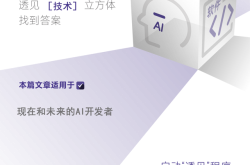Japanese Carmakers Stir Up Market: Potential Merger of Nissan and Honda Sends Share Prices Soaring, Signaling Emergence of World's Third-Largest Automaker
![]() 12/19 2024
12/19 2024
![]() 556
556
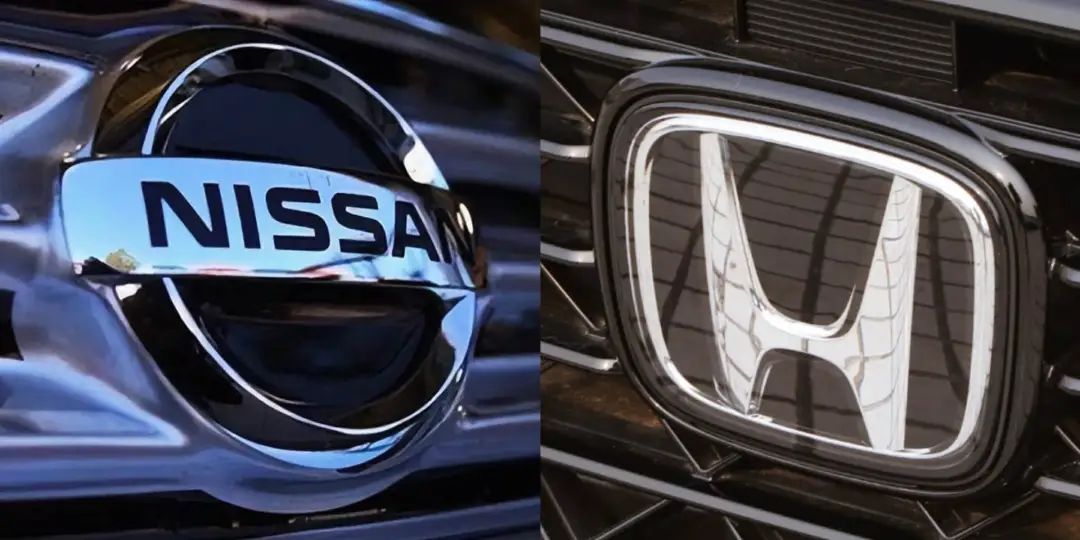
"Japanese" Alliance
Author | Wang Lei, Liu Yajie
Editor | Qin Zhangyong
Merger winds are sweeping through Japan.
Rumors suggest that two major Japanese automakers, Honda and Nissan, are set to embark on merger talks and may even bring Mitsubishi into the fold to form a formidable alliance.
This news has the potential to reshape the global automotive landscape, and Japan's stock market has responded swiftly:
Nissan's share price surged by as much as 24%, while Mitsubishi's climbed 17%.
Honda and Nissan's responses are equally intriguing; they neither confirm nor deny the rumors, but given the cooperative trends between the two companies this year, the news is not entirely unfounded.
Should the merger materialize, it will mark the largest automotive industry merger globally since the combination of Fiat Chrysler and France's PSA Group to form Stellantis, potentially heralding the rise of the world's third-largest automotive group.
01 Potential Birth of the World's Third-Largest Automaker
Early this morning, Japanese media reported that Nissan and Honda are in preliminary merger talks. The two companies are considering establishing a new holding company under which they will operate post-merger and are expected to sign a memorandum of understanding soon.
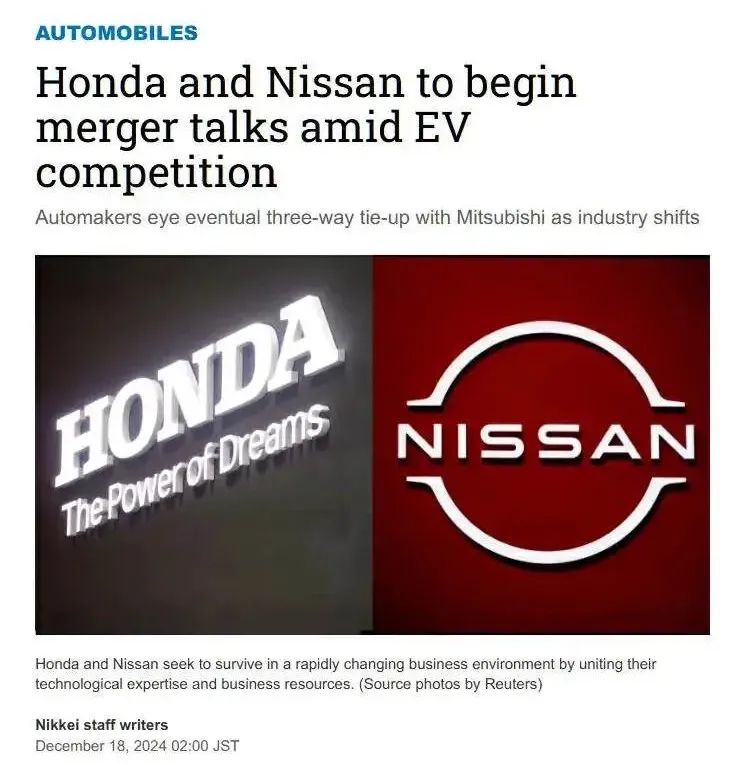
Moreover, the two parties plan to include Mitsubishi Motors in the holding company. Currently, Nissan is Mitsubishi's largest shareholder, owning a 24% stake.
According to Bloomberg, on December 18, Honda Executive Vice President Shinji Aoyama addressed rumors of merger discussions between Honda and Nissan by stating that Honda is considering several options, including merger, capital cooperation, or the establishment of a holding company.
Regarding the latest rumors, Honda and Nissan neither confirmed nor denied them, stating only, "The content of the report was not released by us."
Honda clarified that as announced in March this year, it and Nissan are exploring various possibilities for future cooperation, leveraging each other's strengths, "and we will provide stakeholders with updates at the appropriate time."
A source familiar with the negotiations revealed that talks between Nissan and Honda are still in their nascent stages, and relevant details have not been disclosed.
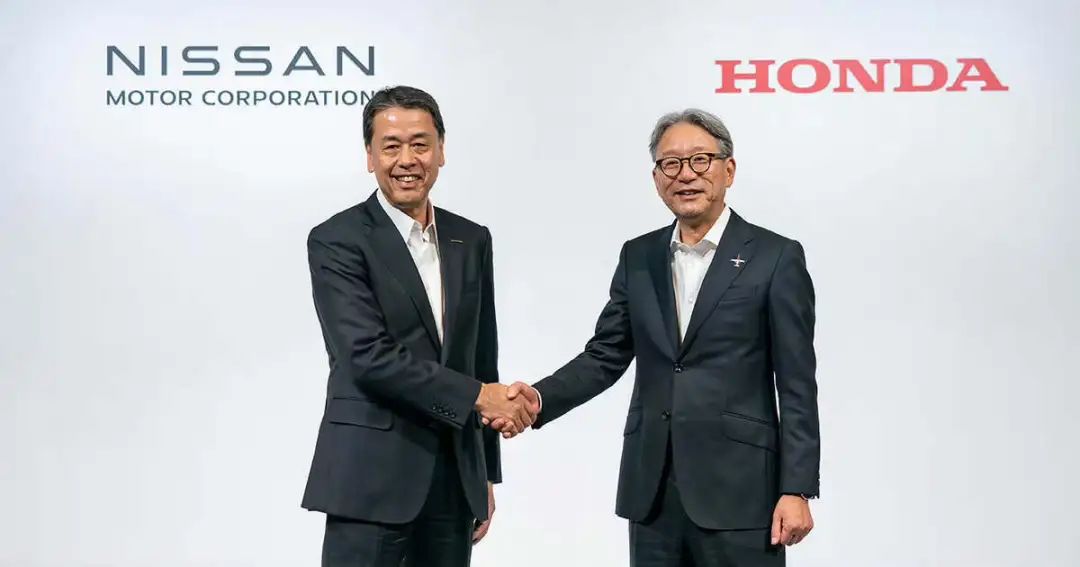
In Japan, Honda and Nissan rank as the second and third-largest automakers, respectively, after Toyota. Should the merger talks succeed, Japan's automotive industry will shift from a three-way split between Honda, Nissan, and Toyota to a scenario where the alliance of Honda, Nissan, and Mitsubishi will compete with Toyota for market share.
Based on 2023 annual sales figures, the combined annual sales of these three companies would exceed 8 million vehicles, positioning them as the world's third-largest automaker after Toyota (11.2 million vehicles) and Volkswagen (9.2 million vehicles).
Of course, the cooperation between the two parties has long been anticipated.
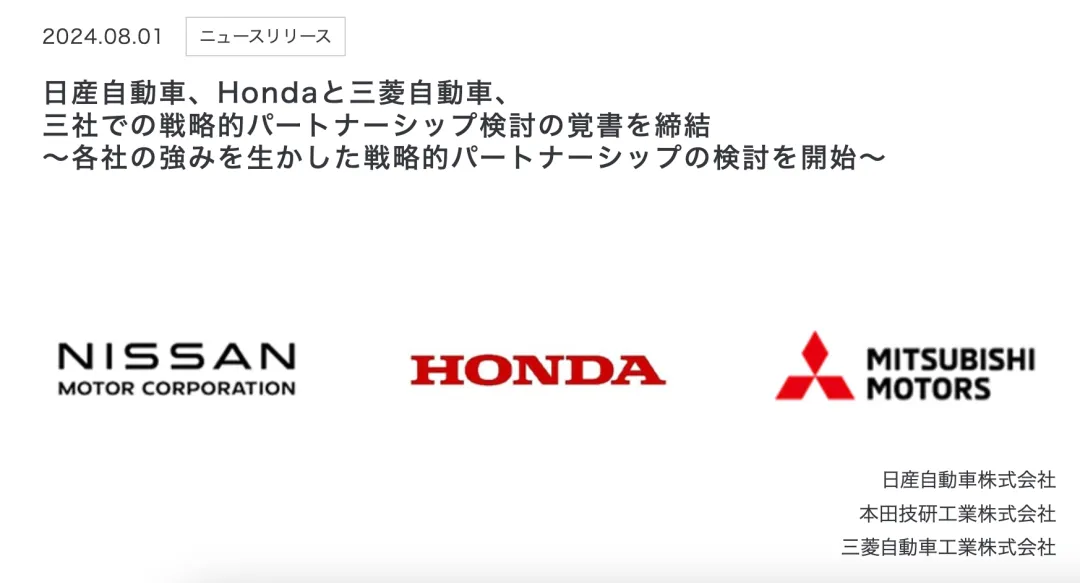
In March this year, Nissan and Honda signed a memorandum of cooperation, indicating their intent to collaborate deeply on software, batteries, and other electric vehicle-related technologies and share costs through joint development to cope with increasingly fierce market competition. Subsequently, Mitsubishi also announced its joining of this alliance.
In August, Honda and Nissan issued a joint statement announcing their agreement to jointly research the next generation of software platform technology and collaborate in-depth in various fields such as batteries, electric axles, and vehicle supplements.
The two companies stated that they would achieve commonality in vehicle batteries and share standards for the specifications of electric axles used in future generations of battery-powered vehicles.
When asked about any capital alliance negotiations between Honda and Nissan, Honda CEO Toshihiro Mibe said, "Honda and Nissan have not discussed a capital alliance, but we do not deny the possibility."
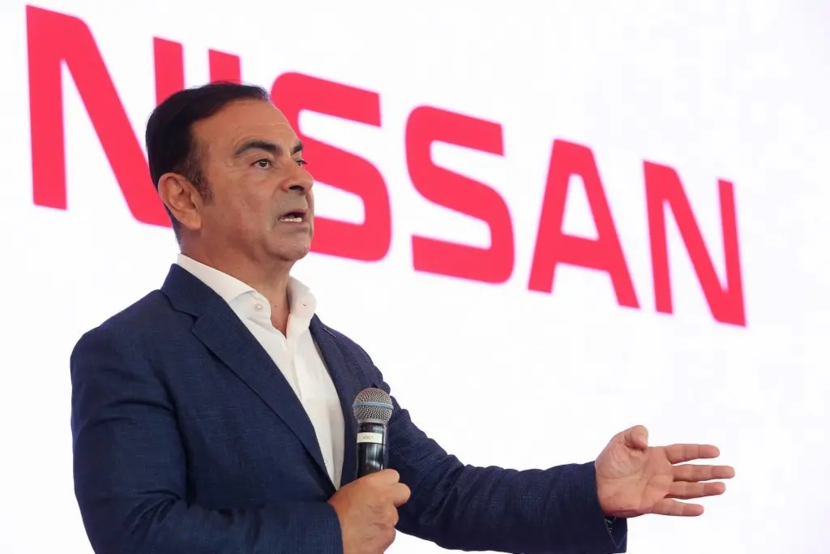
Carlos Ghosn, the former CEO of Nissan, also shared his views on the cooperation between Honda, Nissan, and Mitsubishi, suggesting that Honda might be planning a "disguised acquisition" of Nissan and Mitsubishi.
Honda plans to double its global hybrid vehicle sales to 1.3 million by 2030 and install new, more fuel-efficient hybrid systems in small and medium-sized models from 2026, improving engines, platforms, and control technologies.
Nissan also aims to reduce the cost of its next-generation electric vehicles by 30% and launch 16 electric vehicle models within the next three years.
Whether the two companies can achieve their goals hinges on the smooth progress of their upcoming cooperation.
02 Nissan's Quest for Redemption
Behind this cooperation lies the result of internal and external troubles faced by the companies.
Recently, rumors circulated that Nissan was on the brink of bankruptcy, with at least two senior executives within the company stating that Nissan was actively seeking new investors.
"With the current cash flow levels, Nissan may only survive for 12-14 months, making the introduction of new investment urgent."
In March this year, when Nissan and Honda announced their comprehensive cooperation in the electric vehicle sector, rumors surfaced that Honda might take a stake in Nissan.
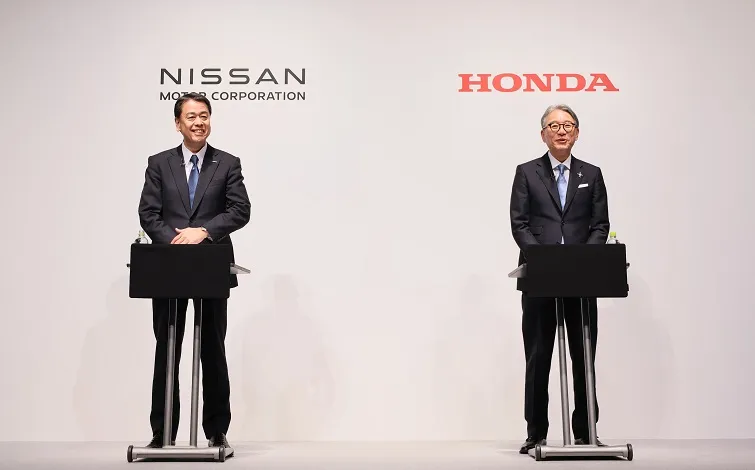
Interestingly, this situation eerily mirrors that of 1999.
In 1999, Nissan faced its first bankruptcy crisis after seven consecutive years of losses exceeding $5 billion. Renault subsequently bailed out Nissan by acquiring a 36.8% stake for $5.4 billion, saving the company and promoting the formation of the Renault-Nissan Alliance.
Twenty-five years later, Nissan is again on the brink of bankruptcy, but this time, Renault has not extended a helping hand and is even selling part of its stake.
Since the arrest of former CEO Carlos Ghosn by Nissan and the Tokyo District Public Prosecutors Office in late 2018, the relationship between Nissan and Renault has become increasingly tense, showing signs of separation.
On the one hand, Nissan began to distance itself from shared platforms and suppliers with Renault; on the other hand, Renault began to reduce its stake in Nissan. In February this year, Nissan and Renault announced a new framework agreement, reducing Renault's shareholding in Nissan from 43.4% to 15%.
Previously, insiders revealed that due to its long-term partner Renault selling part of its Nissan shares, Nissan was searching for long-term investors to counter Renault's share reduction plans, even exploring the possibility of cooperating with other Japanese automakers.

Clearly, Honda is likely to be that "potential investor".
In the second quarter of this year, Nissan's net profit plummeted 99% year-on-year, from JPY 128.6 billion to JPY 995 million. In the third quarter, even the last 1% profit margin could not be maintained, resulting in a net loss of JPY 9.3 billion for the quarter.
Nissan also announced its second downward revision of the full-year forecast this year. Operating revenue was revised downward from JPY 14 trillion (approximately RMB 655.1 billion) to JPY 12.7 trillion (approximately RMB 594.2 billion), and operating profit was cut by 70% from the original JPY 500 billion (RMB 23.4 billion) to JPY 150 billion (approximately RMB 7 billion).
Simultaneously, Nissan initiated a series of emergency self-rescue measures, aiming to reduce JPY 300 billion in fixed costs and JPY 100 billion in variable costs to maintain normal cash flow levels.
To achieve this goal, Nissan has sold a 10% stake in Mitsubishi, raising JPY 68.64 billion, and laid off 9,000 employees worldwide, reducing global production capacity by 20%.
Nissan's selling, general, and administrative expenses will also be reduced, with CEO Makoto Uchida leading by voluntarily forgoing 50% of his monthly salary starting from November, with other executive committee members voluntarily following suit with pay cuts.
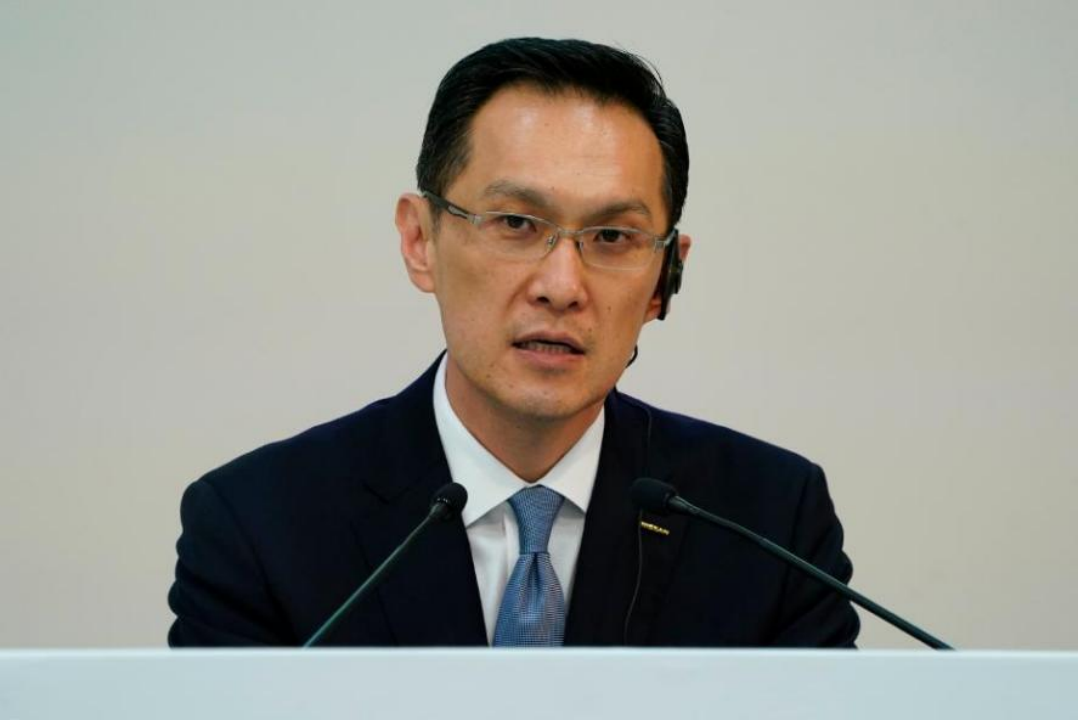
Nissan's management team has also undergone a reorganization. Stephen Ma, the current CFO of Nissan, has returned to China to serve as the chairman of the Nissan China Management Committee, focusing on the strategic implementation and operations of the Chinese market in the future.
Jeremie Papin, the current chairman of the Nissan North America Management Committee, will succeed Stephen Ma as Chief Financial Officer. Both will report directly to Nissan's President and CEO, Makoto Uchida.
Asako Hoshino, the chair of the Japan-ASEAN Regional Management Committee, will no longer concurrently hold this position, which will be taken over by Shohei Yamazaki, previously in charge of the Chinese market.
The extent to which these cost-cutting and efficiency-enhancing measures can reverse Nissan's declining trend remains to be seen, but currently, nothing is more crucial for Nissan than a lifesaving injection of cash.
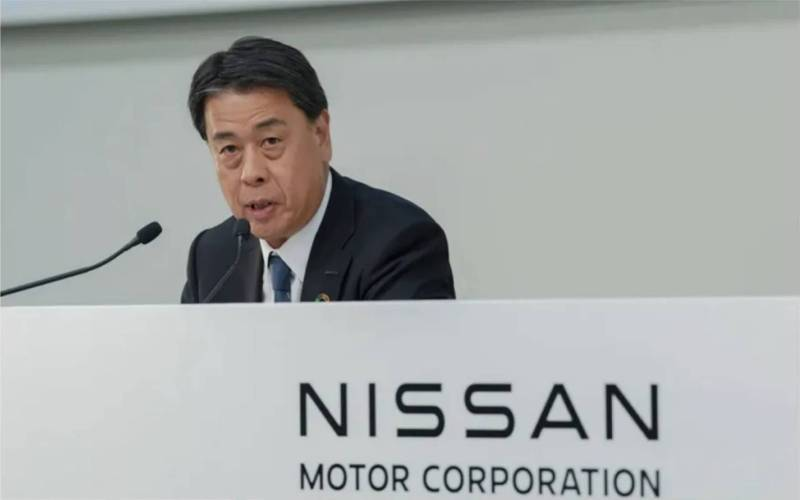
Of course, despite Nissan's current situation, Honda is not faring much better.
In the Chinese market, like Nissan, Honda has seen declines in both profits and sales. From January to November 2024, Honda's sales in China fell by 30.7% year-on-year.
Not long ago, Honda also decided to reduce its global production capacity by approximately 500,000 vehicles, accounting for roughly 10% of its total capacity, including a reduction in production capacity in the Chinese market for the first time.
For both Honda and Nissan, one has temporarily shelved the development of pure electric vehicles, focusing instead on the battle for management rights with Renault. The other chose the wrong technological development path, following Toyota in developing hydrogen energy technology only to find that market trends were not as expected, missing the opportunity for transformation.
Rather than facing the storm alone, it might be more prudent for them to join forces and build a giant ship, which may be the only viable option left for Honda and Nissan.

